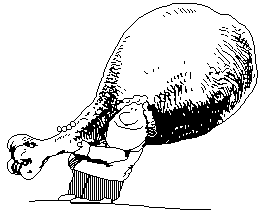File created: 1997-11-26
Substantially revised 2022-11-23
File last modified:
A Thanksgiving Meditation

Thanksgiving, symbolized in North America by a joyous feast in the company of friends and family, is a time to consider that, whatever life’s frustrations, one is nevertheless in a great many ways well off.
For a person contemplating the wide range of human variation and considering how the societies of our world evolved into what they are today, there are several features of the modern world order, in rich and poor regions alike, for which it seems to me that giving thanks may be especially appropriate.
At the risk of being slightly maudlin, I suggest some of them here in case you might like to think about them over the holiday.
Politics & Law
- We believe that government should serve the governed.
(States of the past often argued the reverse.)
- We support courts and parliaments and condemn tyrants.
(Most states since the Bronze Age were run by tyrants and never heard of parliaments. Today even the worst tyrants claim to be chosen by the governed.)
- We experience outrage in the face of corruption, exploitation, and racism.
(Most societies have assumed these are inevitable. Many people still do.)
- We rarely glorify war for the sake of war.
(Modern states seek to avoid war or undertake it with public rationales for its necessity.)
- We condemn the use of torture to extract confessions.
- We condemn outrageous punishment of crimes.
(Nearly all societies throughout history have treated both suspects and criminals badly or executed them summarily.)
- We do not accord legal status to the crime of sorcery.
(It has been a rare society that has not punished or executed sorcerers.)
- We do not practice ritual human sacrifice.
Social Relations & Human Rights
- We support personal freedom as a general idea, and distinguish some specific freedoms such as the freedoms
- to report news
- to study and gain education
- to assemble
- to own property
- to choose one’s own marriage partner
- to create, display, and perform works of art
- to pursue political or economic goals
- both to hold and to share opinions, including dissenting opinions
(Political freedom was a rare idea until modern times. Religious tolerance was nearly unknown, let alone encouraged. In few societies did one pick one’s own mate. In many societies, education —even simple literacy— was actively discouraged, especially for women. Reporting news is still constrained over much of the world even today.)
- We no longer condone slavery, despite its persistence.
(Most societies since the Neolithic have exhibited it.)
- We support monogamy and condemn harems and concubinage.
(This has not been true in most societies.)
- We endorse state protection of individuals from attack by others.
(Thieves, pirates, bullies, gangs, and warlords may be an inevitable risk in all societies, but all modern states try to provide at least some protection from them.)
Health
- Our approach to illness is usually through science and only rarely through magic.
(Most societies from the beginning of the human career have sought to heal illness largely through magic.)
- We seek to alleviate shortage and famine in all parts of the world, however distant.
(In past centuries foreign famines were objects of curiosity more than of concern.)
- We seek to ensure the health and physical well-being of all.
(Few societies have had the means or will to do so.)
- We have become aware of the human role in the ecology of our planet, and there is widespread concern to change that role from destructive to nurturant.
(Until a very few years ago, ecological deterioration was widely ignored in public policy, and even today “climate deniers” remain influential in some countries.)
Knowledge
- We value literacy and seek to extend it to all.
(Throughout history, nearly all humans have been illiterate; literate ones have often sought to confine literacy to limited classes of people.)
- We endorse curiosity about other societies and their cultures and condemn those who treat other societies with knee-jerk contempt.
- We endorse rather than suppress curiosity about how the world works.
(Most societies have preferred a party line to an open mind. Some people still do.)
- We support museums, universities, and research foundations both to improve and apply our knowledge about the world and to transmit that knowledge broadly in society.
- We have espresso, smart phones, plastic wrap, anesthesia, mayonnaise, Wikipedia, and indoor plumbing.
- We devote a holiday to reflecting on all the reasons why we should be thankful.

An earlier version of this page was first created in 1997 and lightly revised over the following years. I composed it for students in a large World Civ class who were heading home for the Thanksgiving holiday, and I wanted to set the modern world in the context of all that has come before. Looking at the modern world in this way, the page suggests that even people living under oppressive regimes today have reason to be optimistic that history is ultimately on their side.
Over time the page attracted translations into 20 more languages, typically as a demos for translation services. Here are such links as were live just before Thanksgiving, 2023:
- Croation by Milica Novak
- http://pro4education.com/a-thanksgiving-meditation/
(Linked 2019-05-29)
- Georgian by Ana Mirilashvili
- lpacode.com/a-thanksgiving-meditation
(Linked 2019-10-22)
- Indonesian by Jordan Silaen
- www.chameleonjohn.com/translations/thanksgiving-Indonesian
(Link confirmed 2019-08-20)
- Kazakh by Alana Kerimova
- theworkscited.com/a-thanksgiving-meditation-2/
(Linked 2020-05-04)
- Norwegian by Lars Olden
- http://prosciencescope.com/a-thanksgiving-meditation/
(Linked 2019-07-20)
- Romanian by Sergey Cosbuk
- translationreport.com/o-cugetare-de-ziua-recuno%C8%99tin%C8%9Bei
(Linked 2020-06-09; contains inserted commercial link.)
- Russian by Natalia Krivova
- edutranslator.com/meditacija-na-den-blagodarenija/
(Linked 2018-10-07)
- Spanish by Rosselyn Evies
- chicksx.com/blog/a-thanksgiving-meditation
(Linked 2024-08-27)
- Thai by Ashna Bhatt
- eduindexcode.com/thanksgiving-meditation/
(Linked 2021-06-02)
- Turkish by Zoltan Solak
- thesciencexperts.com/bir-sukran-meditasyonu/
(Linked 2020-12-19)
Translations no longer available included:
Azerbaijanian by Amir Abbasov (blocked by Azerbaijan security in 2023),
Bosnian by Amina Dugalić,
Czech by Ivana Horak,
Danish by Mille Eriksen,
Dutch by Justin Watson,
German by Sarah Richards,
Latvian by Arija Liepkalnieti,
Portuguese by Diana Gomes,
Spanish by Jenny Spiers,
Swedish by Johanne Teerink,
Uzbek by Sherali Niyazova.
This page and its predecessor version have received

visits since 2016-09-03.
Return to top.
 visits since 2016-09-03.
visits since 2016-09-03.
